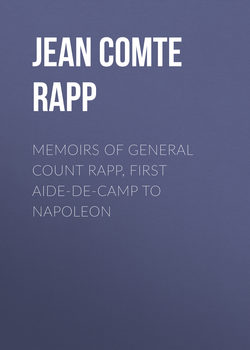Читать книгу Memoirs of General Count Rapp, First aide-de-camp to Napoleon - Jean Comte Rapp - Страница 5
CHAPTER V
ОглавлениеNapoleon, whatever his detractors may say, was neither overbearing nor obstinate in his opinions. He was eager to obtain information, and he wished to hear the opinions of all who were entitled to hold any. Among the members of the Council, the wish to please him sometimes superseded every other consideration; but when he perceived this, he never failed to restore the discussion to its proper tone. "Gentlemen," he would say to his lieutenants, "I summoned you here, not to bring you over to my opinion, but to let me hear your's. Explain to me your views; and I shall see whether the plans which you propose are better than my own."
While we were at Boulogne, he gave a lesson of this kind to the minister of the Marine. He had proposed some questions, to which M. Decrès replied only by a string of compliments. Napoleon wrote to him thus:—"I beg you will send me, in the course of to-morrow, a memorial on the following question: In the present state of affairs, what is most proper to be done, should Admiral Villeneuve remain at Cadiz? Raise your mind to the importance of present circumstances, and the situation in which France and England are placed. Send me no more letters like that which you addressed to me yesterday; they can answer no purpose. I have but one wish, and that is, to succeed; for which, I pray God," &c.
Two days before the battle of Austerlitz, a portion of the army was stationed in an unfavourable position, and the general who occupied it exaggerated its disadvantages. However, when the Council was assembled, he not only admitted that the position was tenable, but he even promised to defend it. "How is this, Marshal?" said the Grand Duke of Berg. "What has become of the doubts you expressed but a short while ago?—"What signifies flattering, when we have met for the purpose of deliberating?" said Marshal Launes, in his turn. "We must represent things in their true light to the Emperor; and leave him to do what he may deem expedient."—"You are right," said Napoleon; "those who wish to win my good graces must not deceive me."
But though he was always ready to receive advice from those who were qualified to give it; yet he could not endure remarks made by individuals who might happen to be ignorant of the subject of which they were speaking. Fesch was one day about to make some observations on the Spanish war. He had scarcely uttered two words, when Napoleon, leading him to a window, said, "Do you see that star?"—It was noon, and the archbishop replied that he saw none. "Well," said Napoleon, "so long as I am the only one who perceives it, I will pursue my own course, and will hear no reflections on my conduct."
On his return from the Russian campaign, he was lamenting, with deep emotion, the death of the many brave men, who had been sacrificed, not by Cossack spears, but by the rigours of cold and hunger. A courtier, who wished to throw in his word, said, with a very doleful air, "We have, indeed, sustained a severe loss!"—"Yes," replied Napoleon, "Madame Barilli1 is dead."
He always sneered at folly; but he never shewed himself averse either to pleasantry or frankness.
Madame Bachioci one day brought to the Tuileries her relation, M. d'A * * * *. She retired after introducing him to the saloon of the household, and he was left alone with me. This M. d'A * * * *, like many of his countrymen, had a very unprepossessing countenance. I was distrustful of him; but, nevertheless, I informed the Emperor he was waiting, and he was introduced. He had doubtless something important to communicate. Napoleon, by a motion of his hand, directed me to return to the saloon. I pretended not to observe him, and I remained, for I was apprehensive for his safety. He advanced towards me, and said that they wished to be alone. I then withdrew, but I left the door of the chamber partly open.
When Napoleon had dismissed M. d'A * * * *, he asked me why I had been so reluctant to withdraw. "You know," replied I, "that I am not officious; but I must frankly confess that I do not like your Corsicans." He himself related this anecdote, which displeased some of the individuals of his family. However, I am persuaded that he would rather not have heard me speak of his countrymen in this way.
One evening, after the battle of Wagram, we were playing at vingt-et-un. Napoleon was very fond of this game: he used to try to deceive those he was playing with, and was much amused at the tricks he played. He had a great quantity of gold spread out upon the table before him. "Rapp," said he, "are not the Germans very fond of these little Napoleons?"—"Yes, Sire, they like them much better than the great one."—"That, I suppose," said he, "is what you call German frankness."
1
A celebrated opera singer.
